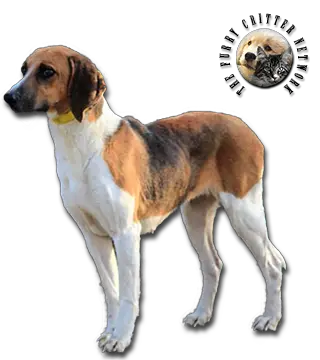Breed Standard
Head: Fairly short in the Great Anglo-French Hound, longer in the Small Game Anglo-French Hound. Broad, flat skull. Slight occipital peak. Pronounced stop. Nosebridge approximately as long as skull.
Ears: Set on at least at eye level, short, flat, slightly folded toward the tip. Set on low in the Small Game Anglo-French Hound.
Eyes: Large, dark brown.
Body: Balanced and well-proportioned. Strong neck with a slight dewlap in the Great Anglo-French Hound. Broad, well let-down chest. Curved ribs. Broad, short loin.
Tail: Thick at the base, fairly long, well covered with hair.
Hair: Lying flat against the body and fairly thick. Short, dense, and smooth in the Small Game Anglo-French Hound. Skin white with black or orange patches, depending on variety.
Coat: White and black: large mantle, black spots of varying size, sometimes with black or steel-grey flecks (or tan flecks, only on the legs). Pale spots above the eyes (pips), light tan markings on the cheeks, below the eyes and ears, and at the base of the tail. - White and orange: white and lemon or white and fairly light orange. - Tricolor: usually with a black mantle or spots of varying size. Rich or coppery tan, not smoky. A mixed wolf grey coat is not a fault.
Size: Great Anglo-French Hound: 60 to 70 cm. Small Game Anglo-French Hound: 48 to 56 cm.
Weight: Great Anglo-French Hound: 30 to 35 kg. Small Game Anglo-French Hound: approx. 25 kg.
History
The Anglo-French Hound is the result of crossing English and French hounds. The first crosses most certainly occurred in the sixteenth century. By the late nineteenth century, huntmasters highly prized this all-terrain dog as a multi-purpose pack hound for hunting deer, wild boar, and fox. Anglo-French Hounds come in various sizes and coat colors, based on the breeds used in their development: - The Great Anglo-French Hound, descended mainly from the Poitevin and crosses between the Gascon Saintongeois and the Foxhound; - The Great Anglo-French Tricolor Hound, the variety with the most English blood; - The Great Anglo-French White and Orange Hound (now very rare), the product of crosses between the Billy and the Foxhound; - The Great Anglo-French White and Black Hound, descended from the Gascon Saintongeois; and - The Small Game Anglo-French Hound, developed recently by crossing the Harrier with the Poitevin, the Porcelaine, the Small Gascon Saintongeois, and the Small Blue Gascony Hound. Initially called the Small Anglo-French Hound, this variety was recognized as the Small Game Anglo-French Hound in 1978.
Behavior
Some of the finest breeds were used in developing the Anglo-French Hound. English blood, in particular, gave him his build, bone structure, and vigor, while French blood gave him a keen nose and resonant voice. Hardy, strong, quick, courageous, and tenacious, the Anglo-French Hound adores hunting. He hunts large and small game on all types of terrain. He requires firm training.
Anglo-French Hounds are not suited to city life. They are kept in kennels in packs. They need space and exercise and require regular brushing and attention to the ears.
Function
Anglo-French Hounds are used in most large game hunting packs.
Health
There are no consistent health issues documented for the Anglo-Francais at the time of this writing. Be sure to periodically check the ears and clean when necessary.






